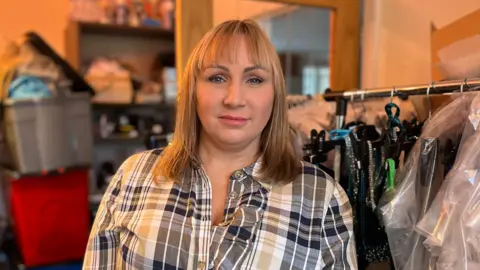 Getty Images
Getty ImagesThe UK’s drug safety regulator is asking doctors to be alert for patients who may be misusing obesity injections, such as Wegovy.
It follows reports of some people who are not obese becoming sick, after using the jabs for weight loss.
The Medicines and Healthcare products Regulatory Agency (MHRA) stresses that the drugs are only meant for treating obesity and diabetes.
Health Secretary Wes Streeting has backed the call, saying the drugs are “serious medicines” and not “for people to get a body beautiful picture for Instagram”.
While most side-effects are mild, some can be serious, says the MHRA.
It adds that the drugs should only be prescribed by a registered healthcare professional.
When appropriately used, in line with the product licence, the benefits of these medications outweigh the risks for patients, says the regulator.
But this benefit-risk balance is positive only for those patients within the approved indications for weight management or type 2 diabetes, as described in the product information.
Dr Alison Cave, MHRA Chief Safety Officer, said all medicines carry a risk of potential side-effects: “We encourage healthcare professionals to ensure patients being treated with these medicines are aware of the common side-effects and how to minimise risk.”
The most common side-effects include feeling sick, vomiting, bloating, constipation and diarrhoea.
Dr Vicky Price, president of the Society for Acute Medicine, told the BBC she had seen patients who weren’t overweight coming in with issues.
“The most common thing that we’re seeing is anything related to the gut. So diarrhoea, vomiting, constipation, people not being able to eat, getting very dehydrated as a result of that.”
 Lorna Edgar
Lorna Edgar‘Miracle injection’
Lorna Edgar’s GP told her she didn’t qualify to get the jabs on the NHS.
So she got them from an authorised prescriber at an online pharmacy. But after taking them for a month, she collapsed on the bathroom floor.
“In the middle of the night it felt like someone had just stabbed something straight into my stomach,” she told the BBC.
Lorna developed pancreatitis, a potentially life threatening condition and a rare side effect of the jab she used.
She spent five days in hospital and has been left with chronic health problems.
“I thought it was this miracle injection that was 100% safe,” she said.
“My children were frightened see how poorly I actually was. It was just so scary.”
Health Secretary Wes Streeting said: “Weight-loss drugs have enormous potential. When taken alongside healthy diet and exercise, they can be game-changers in tackling obesity and getting people back to good health.
“But these are not cosmetic drugs that should be taken to help get a body beautiful picture for Instagram. These are serious medicines and should only be used responsibly and under medical supervision.
“They’re not a quick fix to lose a few pounds, and buying them online without appropriate assessment can put people’s health at risk,” he said.



